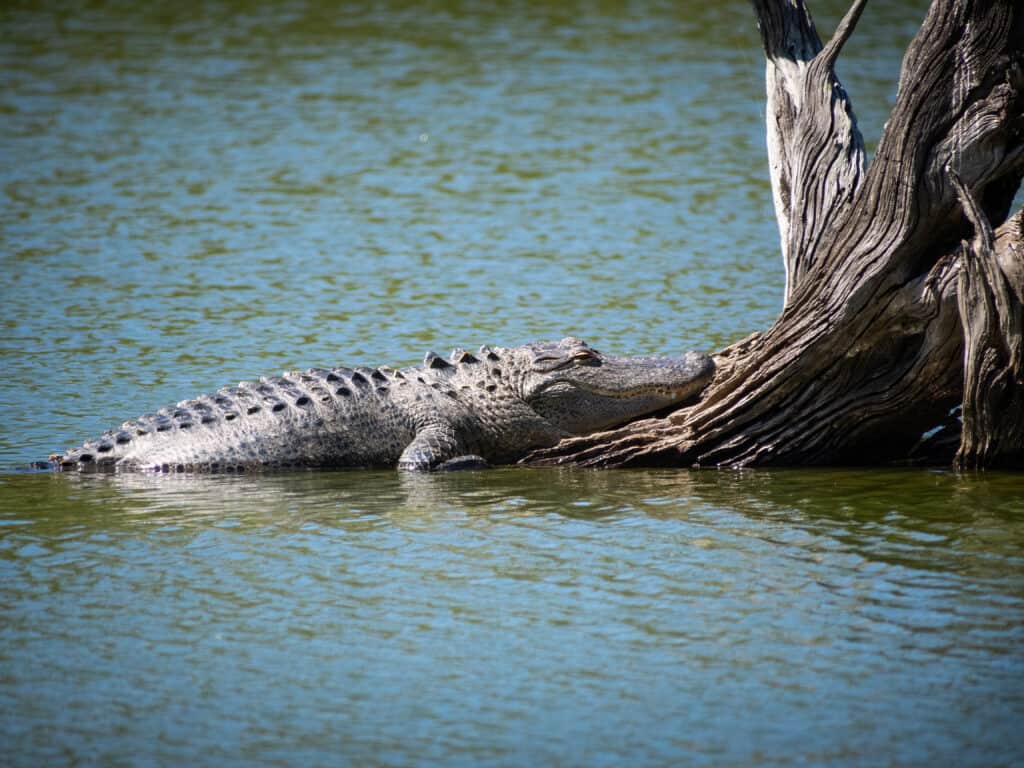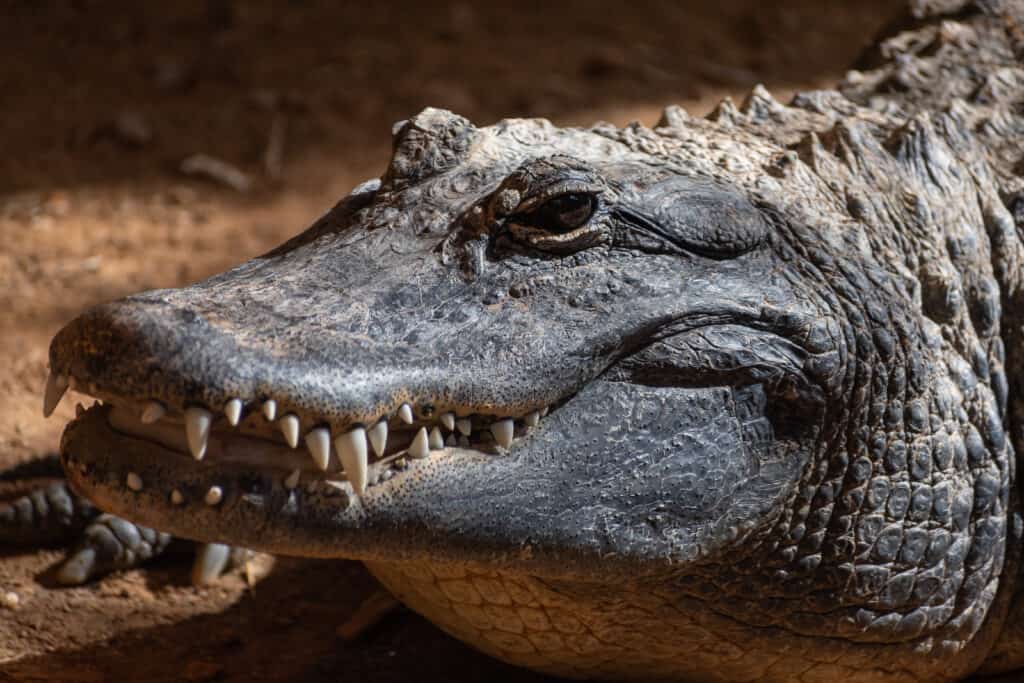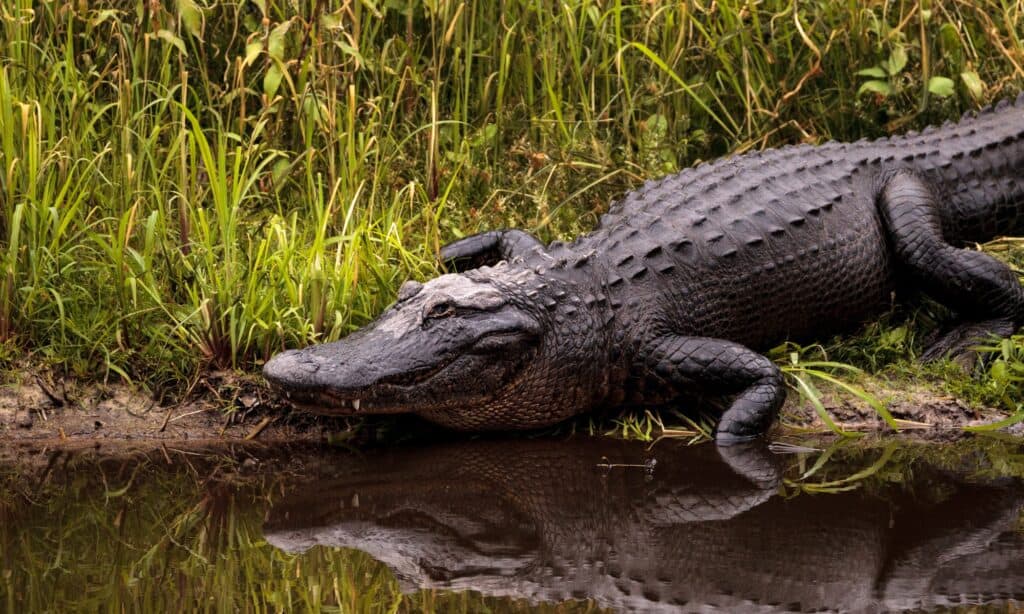Reaching lengths of up to 19 feet and living fifty years or more in the wild, alligators are some of the most impressive reptiles out there. Like crocodiles and komodo dragons, American alligators are considered apex predators. There are alligators living throughout the southeastern United States, including parts of Texas. But just how many alligators live in Texas?
Let’s take a look at these fearsome predators, and explore their presence in the Lone Star state. We’ll find out how many gators call Texas home and where in Texas you might find them. We’ll also discover whether or not you’re allowed to hunt Texas’s alligators and how to stay safe around these primeval reptilians.
Introduction: The American Alligator

Alligators often reach 8-12 feet in length, though they can grow even larger.
©Eugenie Robitaille/Shutterstock.com
Known scientifically as Alligator mississippiensis, the American alligator has been around for around 65 million years. In all that time, they’ve remained virtually unchanged.
Alligator Appearance and Size
Alligators look like big, semi-aquatic lizards. They have scaly, brown-green hides. Adults often reach 8-12 feet in length, though they can grow even larger. Alligators are very similar in appearance to crocodiles, but there’s one surefire way to distinguish the two: the snouts and teeth. Alligators have wide snouts, and when they close their mouths, you can only see their top teeth.
Alligator Habitat and Range
If you’re wondering how many alligators live in Texas, then you might be interested to know that alligators occupy much of the southeast. They can be found in the fresh waters of Florida in the south, North Carolina in the north, and Texas in the west. They’re present in the entirety of both Florida and Louisiana. Unlike saltwater crocodiles, alligators can’t live in salty water, so you won’t generally see them in or near the ocean.
How Many Alligators Are There in Texas?

There are between 400,000-500,000 alligators in Texas.
©iStock.com/CoinUp
According to the Texas Parks and Wildlife Department, there are between 400,000-500,000 alligators in Texas. Officials with the Wildlife Division estimate alligator populations by surveying alligator territory and counting the number of gators they see. They also conduct nest counts, which count the number of alligator nests in a given location. To count alligators, researchers actually go out at night with spotlights, counting the number of alligator eyes they see.
What Part of Texas Has Alligators?
All of Texas’ alligators live in the eastern half of the state, generally east of the Rio Grande River. Alligators like densely vegetated permanent sources of water, like wetlands and lakes. So, the greatest population densities occur in optimal riparian zones. In Texas, these areas primarily occur in the southeastern part of the state, in places like Brownsville, Lake Jackson, and Corpus Christi.
Alligators live in all types of freshwater, including lakes. They can be found in Lake Lewisville, Lake Worth, Caddo Lake, Eagle Mountain Lake, and many more of east Texas’s waterways.
Which U.S. State Has the Most Alligators?
According to surveys, Louisiana is home to more alligators than any other state. There are an estimated 200,000 gators in Louisiana — that’s four times the alligator population of Texas! But why are there so many gators in Louisiana? Unlike Texas, which is only partially habitable to alligators, Louisiana is wholly suited to gators.
Surprisingly, Florida comes in second in terms of alligator population with 1.3 million gators. Like Louisiana, all of Florida’s fresh waters are home to alligators. Some lakes, like Lake Okeechobee, have dense populations of gators.
Can You Hunt Alligators in Texas?

The population of alligators in Texas is healthy enough to allow hunting.
©iStock.com/LagunaticPhoto
Now that we know how many alligators live in Texas, let’s find out if you can hunt these giant reptiles in the Lone Star state. At one time, alligator populations were so low that they were actually at serious risk of extinction. But, thanks to federal protections enacted in the 1960s, alligator populations rebounded. They did so well that they were actually removed from the endangered species list in 1978.
This means that the population of alligators in Texas is actually healthy enough to allow hunting. More than that, collectors can actually harvest alligator eggs from nests and even farm gators in the Lone Star State. So, yes: you can hunt alligators in Texas, but only with a valid hunting license.
How To Stay Safe Around Alligators
Alligators might be cute as babies, but they soon turn into incredibly adept killing machines. Humans might be the dominant species on the planet, but they simply can’t win a fight against a hungry gator.
There are a few easy steps you can take to avoid being attacked by an alligator. First, never feed alligators, or approach the water’s edge in places where big gators are known to live. Also, don’t swim or wade in the presence of adult alligators. Finally, never disturb alligator nests, as the mothers are likely close by.
Up Next:
- Alligators in Texas: Where They Live
- The Biggest Alligator Ever Found in Texas
- How Many Alligators Live in Arkansas?
The photo featured at the top of this post is © Ernie Hounshell/Shutterstock.com
Sources
- , Available here: https://www.wlf.louisiana.gov/species/detail/american-alligator#:~:text=Louisiana%20and%20Florida%20have%20the,common%20in%20our%20coastal%20marshes
- , Available here: https://www.britannica.com/animal/alligator
- , Available here: https://tpwd.texas.gov/huntwild/wild/species/alligator/history/index.phtml
- , Available here: https://dfwwildlife.org/wp-content/uploads/2018/09/Alligator-Distribution-in-Texas.pdf
Thank you for reading! Have some feedback for us? Contact the AZ Animals editorial team.






